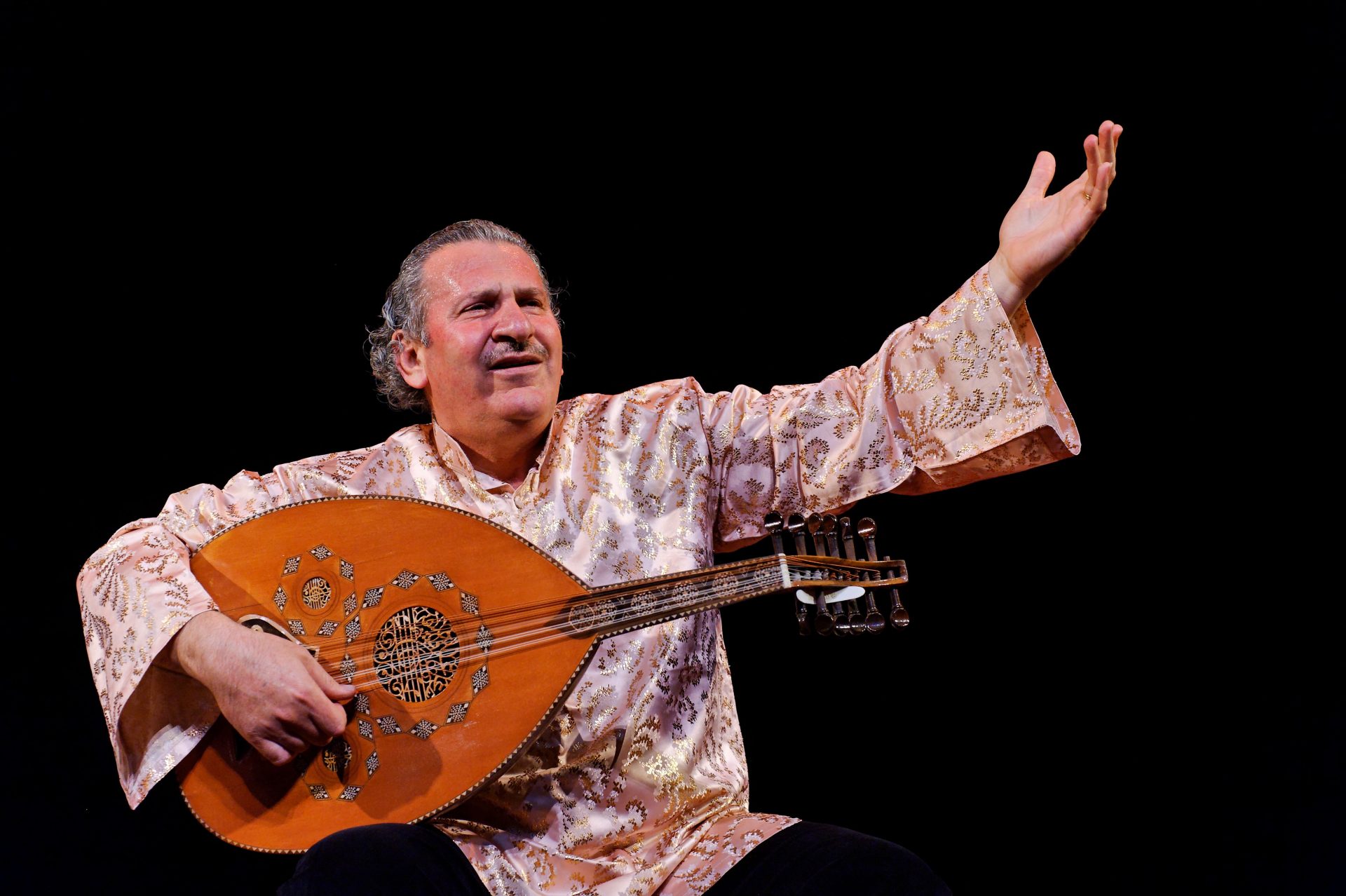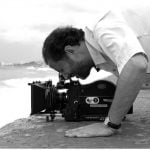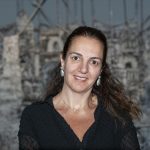In the Jazira region music is an expression of respect and appreciation for the diversity of its people and traditions, and the artist Ibrahim Keivo has become one of most well known voices from this extraordinary area known as The Island, in Arabic.
You were born in Al-Hasakah, in a region rich in diversity of cultures and artistic heritage, Jazira. Your mother introduced you to the Armenian hymns. How did your passion for music begin?
I was born in a small village called Dokar, near the town of Amuda in the Hasakah Governorate in Syria. This region, which is considered part of Fertile Crescent (Tigris and Euphrates) and is also called Mesopotamia, is a historical geographical area that is one of the first civilizational centers in the world.

My passion for music started very early for two main reasons. The first reason was my mother and father. My mother used to recite Armenian hymns to me before bed. I was charmed by those hymns even though I did not fully understand their meanings. My father also supported me through his belief that I was born to be a musician. My father owned and worked in a grain mill in the area. The windmill was a massive gathering of people from all over the area. My father’s mill has always been considered a cultural center for the entire region.
My father got a radio at that time. Customers took the opportunity to listen to music and share news, stories while they were grinding their grin. My father helped me a lot to make use of my presence at the windmill to build my musical repertoire and to talk to people about music.
The second reason for my passion for music, that I was born and raised in the Yazidi-majority village of Dokar, where music is an essential pillar of the Yazidi religion and is of a sacred nature. I listened to very old Yazidi religious hymns that have a great musical value.
All these aspects contributed to my passion towards music. When I was nine, I started making musical instruments manually from wooden and plastic oil pans. When I was twelve, my father bought me a piezo from a Sufi man. Back in my village of Dokar, there used to be a good environment for music. I remember when I started playing some simple tunes, I was receiving indescribable encouragement from everyone, and that encouragement has contributed greatly to my passion for music even today.

Can you share with us your experience when you studied with Nuri Iskandar (a pioneer of Syriac or Aramaic music)?
I consider Nuri Iskandar to be my godfather. The truth is when I talk about him, I can’t stop! He means a lot to me, and I will always be grateful to him. I got to know him at the beginning of my studies of music at the Aleppo Institute of Music. We had many conversations during my studies at the institute about the richness of the island region and its type of music. He told me at that time that I have a unique musical background from the Jazira region, and it would be a golden opportunity to introduce the music of that region. We were not only a teacher and a student, but we were friends and that meant a lot to me.
I can portray my relationship with musician Nouri as if I came with a bag full of colors and tools, and Nouri helped me arrange those colors and tools and organize them in the best way to use them and employ them in the right direction. His support continued until my participation in the Syrian Song Festival, as my business began to spread throughout Syria, as well as to some extent globally. At the Syrian Song Festival, I won valuable prizes, such as the Golden Ornina Award for the song “Good Evening”.
Music is a true reflection of the condition of the people of the Jazira region and has contributed to bringing the people together and highlighting the features of their identity.
One of my most important experiences with the musician Nouri, which I consider a unique participation and a milestone in my musical career, is the joint work of Nouri Iskandar’s group and the Dutch state, which is the work of Abadat Bacchus. It was presented at the Acropolis Theater in Greece, there I won the Director of Action Award, which I am very proud of. This project widened my audience globally and opened many horizons for me at the global level. After that work, I participated in many works worldwide, and the results of those participations was the completion of my international album, which is titled (Ibrahim Kivu, Singing the Syrian Jazira), which won the Charles Cruz Prize from France.
In addition to the Bedouin traditions, you found great inspiration in the ancient civilizations and religions that have survived in this region: Assyrian whose main language is Aramaic, Syriac, Christianity, Yezidi and the ancient Kurdish religion… It tells us how different cultures and music are a wonderful part of the culture Popularity across the region – can you describe how deeply ingrained it was in the daily lives of the people who lived there?
When I composed the song “Massa Al Khair”, as you might know, the word “Massa Al Khair” (Good Evening) is a greeting taken from our daily lives there, when one walks on a street in the Jazira region perhaps one will hear that greeting in several different languages depending to the races and nationalities present there. I think that this region is based on diversity, it would not and could not exist without diversity. All of this inspired me to compose the song, which reflects the diversity of the region. In the same song there is a part that says, “Get up and dance Hallaya”. Hallaya is a dance that is performed by all the people of the Jazira region of all races. Music is a true reflection of the condition of the people of the area and has contributed to bringing the people of the area together and highlighting the features of their identity. The music also contributed greatly to introducing various ethnic groups to each other on the island itself. On the other hand, the song “Massa Al Khair” contributed to introducing the vocabulary of the Jazira region that presented a new Syrian musical type, the island’s type.
In the Jazira region music is as an expression of respect and appreciation for the diversity of the region. For example, the people of the island are keen to sing songs and perform dances in various languages at wedding parties, to represent all races and nationalities in the parties That enhance cohesion and collective participation by all the guests.
Music played a role in introducing the history, culture, and beliefs of the ethnic groups in Jazira region. Let’s take an example of the great role played by Kurdish Bayezok music, which is a distinctive and unique form of music.
Bayezok music tells the Kurdish epics. The Syriac and lyrical music (Al-Rawa), which presented stories from the history of the Syriacs and their heroes for the region. Al-Musifi also contributed to introducing the region to the association of Syriac music with the Aramaic language and the Christian religion. Another example from my memories of my father’s mill, some Bedouin Arabs used to come to my father’s mill and thus sing there. Where I got acquainted with the color of the Bedouin mawwal and the musical rebab, which reflects the Bedouin culture. Music provided an opportunity for everyone to coexist. The way that music connects people is tell us that through music we can create world peace. Music is the victorious power over all wars, the rhythm of war is a false rhythm, and the rhythm of music is the correct rhythm that constitutes the human identity of man.
They say that listening to different musical instruments can create different feelings. For example: tambourine is believed to be the first instrument known to humans. We may feel the beat of a tambourine close to our heartbeat. While listening to the sound of stringed instruments can create different feelings. Do you feel such feelings of love, sadness, melancholy …? Can they convey differently the playing of a percussion or a stringed instrument?
Here I distinguish between the influence of music on me as a listener and as a player. I am very comfortable with stringed instruments, which are the closest to my heart. This is due to my close relationship with the Buzuq instrument since my childhood. My relationship with the Buzuq is like we are brothers. We have conversations that may be a celebration of success and may be blamed and reproached. That’s made stringed instruments very close to my heart as a listener and as a player. On the other hand, I see that beautiful melody is the main criterion for the impact of music on a person.
You are based in Germany, and you travel across borders to present the beauty of your art to international audiences – in 2002 as you mentioned you sang in “Bacchus” for Euripides with music composed by Nuri Iskandar. Since that year, has your music evolved or been influenced by the music styles you’ve encountered since the Osnabruck Chamber Music Orchestra?
As I mentioned earlier, my experience with Nouri Iskandar, introduced me to world music. I worked and participated in the performance of a new musical genre. For example, I participated in a musical performance that mixes flamenco with Jazira music in Spain. This experience gave me a broader view of the musical genre. It opens my eyes about the possibility of mixing different types together. I think it is interesting to stick to the color of the heritage of a region, but it is wonderful to present it in a new way along with other colors and to highlight the beauty of the musical colors next to each other. Sometimes it would be nice to dress some musical types in new clothes while preserving their true value and charm.
As a result, I was influenced by all these musical genres and I may have influenced them in some way. It is a process like grafting that gives unique and beautiful fruits. My most memorable incidents in the international theaters are the Arab singing for a Western color or the European singing for an Arab or Kurdish type. All of this reinforces my belief that the message of humanity is one and that we have one root, which is love.
This exceptionally rich heritage is a gift that you share with younger generations and Western audiences across borders; A legacy that has been greatly affected by the challenges of displacement and we feel it is essential that we preserve it for the future. Would you like to share with us any new project you are working on these days?
Currently, I am preparing for a musical project in Germany, specifically with the Yazidi Academy in Hanover. The project is about teaching and sharing my experience in singing and music and the experiences that I brought with me to the Academy’s students to preserve the Yazidi musical heritage, and I am very excited about this experience.
I am also working on a new CD that contains traditional songs that I composed. The work is done with fellow musicians and brothers from different backgrounds. In addition, I have a lot of parties in different parts of the world.
Finally, I have a wish that I would like to share with Qistena. I hope one day all the weapons used in wars will be converted into musical instruments, both light and heavy. I always imagine tying strings on the Kalashnikov gun in a certain way so that it can produce beautiful melodies. I imagine that all these weapons would present a musical evening to the world and become tools for spreading peace.
🌿

Interview by Abdullah Alsmaeel



